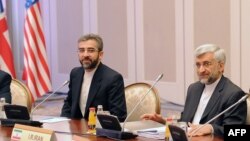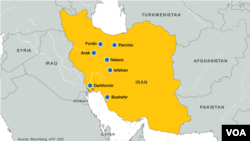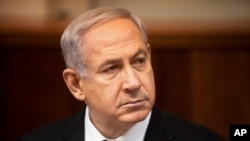ALMATY, KAZAKHSTAN —
World powers and Iran still appeared far apart on Friday in negotiations on Tehran's nuclear program that were aimed at calming tensions which could boil over into war.
As talks got under way in Kazakhstan, the six nations: the United States, Russia, China, France, Britain and Germany - sought a concrete response from Iran to their February offer to ease sanctions if it stops its most sensitive nuclear work.
2012
January: IAEA confirms Iran is refining uranium to 20% fissile purity
February: UN inspectors end talks in Tehran without inspecting disputed military site at Parchin
April: Iranian President Mahmoud Ahmadinejad vows Iran will not surrender its nuclear rights
May: UN inspectors report finding traces of significantly upgraded uranium at an Iranian site
July: EU begins total ban on Iranian oil imports; US expands sanctions
September: IAEA demands access to Parchin; Iran calls EU sanctions "irresponsible"
December: IAEA says it made progress in talks with Iran; US imposes more sanctions.
2013
January: Iran says it will speed up nuclear fuel work
February: Iran's supreme leader Ayatollah Ali Khamenei rejects direct nuclear talks with the U.S.; Iran, world powers meet, agree to more talks.
May: IAEA says Iran has expanded nuclear activity.
September: Iranian President Hassan Rouhani says Iran will not seek weapons of mass destruction. Iran and world powers agree to resume nuclear talks.
October: Iran set to begin talks with five permanent members of U.N. Security Council and Germany
Iranian negotiators said they had outlined their own "specific'' proposals, but a Western diplomat said they had still not responded clearly to the initiative from the big powers.
The dissonant views suggested the two sides had not narrowed differences that have bedeviled a decade of on-off talks.
"We are somewhat puzzled by the Iranians' characterization of what they presented at this morning's plenary,'' a Western diplomat said. "There has not yet been a clear and concrete response to the...proposal [from the six powers].''
Iran's deputy negotiator Ali Bagheri did not say whether the offer was acceptable, but told reporters his side had made "specific proposals...for the start of a new round of cooperation''.
"Naturally, the talks will continue today and, if necessary tomorrow, until the two sides exchange their views and until a new platform for cooperation is formed,'' he said after talks paused for Iranian negotiators to join Friday prayers at Almaty's main mosque.
The dispute centers on Iranian efforts to enrich uranium, which world powers suspect are part of a covert drive to achieve atom bomb capability. The U.N. Security Council has demanded that Iran stop the process, in several resolutions since 2006.
Iran argues it has the right to enrich uranium for peaceful purposes under international law and denies its nuclear work has military aims. It has refused to change course unless the big powers recognize its right to enrichment and lift sanctions.
Stakes are high because Israel, widely assumed to be the Middle East's only nuclear-armed power, has threatened to bomb the Islamic Republic's atomic sites if diplomacy fails to rein in a foe which it sees as bent on its destruction.
Chances for a quick breakthrough are seen as scant, with Iran not expected to make any major decisions on nuclear policy until after its presidential election in June.
Western diplomats are hoping at least for serious discussion of their February proposal, under which Iran would have to close a nuclear facility and ship some enriched uranium stockpiles abroad in return for modest relief on sanctions on Iranian petrochemicals and trade in gold and other precious metals.
Looming pain
For years, Iran has resisted ever-harsher sanctions and pressure to retreat from a nuclear program that enjoys broad support amongst its fractious political leadership.
Iran's chief negotiator, Saeed Jalili, said in a speech at Almaty University on the eve of the latest talks that their success hinged on "acceptance of the rights of Iran, particularly the right to enrichment''.
The six nations, however, say this right only applies when nuclear work is carried out under sufficient oversight by U.N. inspectors, something Iran has refused to grant.
For now, Iran may play for time, trying to keep diplomacy on track to avert new sanctions before the June election.
Tehran's conversion of some its higher-grade uranium stockpile to nuclear reactor fuel may have bought time for diplomatic efforts to resolve the dispute peacefully.
But if talks fail to produce sufficient progress, Western governments are likely to impose yet more economic penalties, with the double aim of pressuring Tehran while seeking to persuade Israel to hold back from any military action.
Israeli Prime Minister Benjamin Netanyahu told visiting U.S. senators on Thursday that Tehran's nuclear work must be stopped.
"We cannot allow a situation in which a regime that calls for our annihilation has the weapons of annihilation,'' he said.
U.S. President Barack Obama sought to cool tempers during a trip to Israel in March, saying diplomacy was the best option, but he hinted at possible military action as a last resort.
"The probable failure of this round [of talks] does not mean that [military] strikes are imminent or that diplomacy later this year has no chance,'' said Cliff Kupchan, Middle East director at the Eurasia consultancy. "Obama's recent trip reassured Israel that Washington holds a tough position.''
In the best case scenario, Western diplomats say, this could give the sides time to iron out details of any future deal.
"If Iran ... really engages in a negotiation, even if we all agreed today on the terms of an agreement, it would take time to put [it] together because this is a highly technical agreement,'' a senior U.S. official said before heading to Almaty.
As talks got under way in Kazakhstan, the six nations: the United States, Russia, China, France, Britain and Germany - sought a concrete response from Iran to their February offer to ease sanctions if it stops its most sensitive nuclear work.
Iran's Nuclear Program
Iran's Nuclear Program2012
January: IAEA confirms Iran is refining uranium to 20% fissile purity
February: UN inspectors end talks in Tehran without inspecting disputed military site at Parchin
April: Iranian President Mahmoud Ahmadinejad vows Iran will not surrender its nuclear rights
May: UN inspectors report finding traces of significantly upgraded uranium at an Iranian site
July: EU begins total ban on Iranian oil imports; US expands sanctions
September: IAEA demands access to Parchin; Iran calls EU sanctions "irresponsible"
December: IAEA says it made progress in talks with Iran; US imposes more sanctions.
2013
January: Iran says it will speed up nuclear fuel work
February: Iran's supreme leader Ayatollah Ali Khamenei rejects direct nuclear talks with the U.S.; Iran, world powers meet, agree to more talks.
May: IAEA says Iran has expanded nuclear activity.
September: Iranian President Hassan Rouhani says Iran will not seek weapons of mass destruction. Iran and world powers agree to resume nuclear talks.
October: Iran set to begin talks with five permanent members of U.N. Security Council and Germany
The dissonant views suggested the two sides had not narrowed differences that have bedeviled a decade of on-off talks.
"We are somewhat puzzled by the Iranians' characterization of what they presented at this morning's plenary,'' a Western diplomat said. "There has not yet been a clear and concrete response to the...proposal [from the six powers].''
Iran's deputy negotiator Ali Bagheri did not say whether the offer was acceptable, but told reporters his side had made "specific proposals...for the start of a new round of cooperation''.
"Naturally, the talks will continue today and, if necessary tomorrow, until the two sides exchange their views and until a new platform for cooperation is formed,'' he said after talks paused for Iranian negotiators to join Friday prayers at Almaty's main mosque.
The dispute centers on Iranian efforts to enrich uranium, which world powers suspect are part of a covert drive to achieve atom bomb capability. The U.N. Security Council has demanded that Iran stop the process, in several resolutions since 2006.
Iran argues it has the right to enrich uranium for peaceful purposes under international law and denies its nuclear work has military aims. It has refused to change course unless the big powers recognize its right to enrichment and lift sanctions.
Stakes are high because Israel, widely assumed to be the Middle East's only nuclear-armed power, has threatened to bomb the Islamic Republic's atomic sites if diplomacy fails to rein in a foe which it sees as bent on its destruction.
Chances for a quick breakthrough are seen as scant, with Iran not expected to make any major decisions on nuclear policy until after its presidential election in June.
Western diplomats are hoping at least for serious discussion of their February proposal, under which Iran would have to close a nuclear facility and ship some enriched uranium stockpiles abroad in return for modest relief on sanctions on Iranian petrochemicals and trade in gold and other precious metals.
Looming pain
For years, Iran has resisted ever-harsher sanctions and pressure to retreat from a nuclear program that enjoys broad support amongst its fractious political leadership.
Iran's chief negotiator, Saeed Jalili, said in a speech at Almaty University on the eve of the latest talks that their success hinged on "acceptance of the rights of Iran, particularly the right to enrichment''.
The six nations, however, say this right only applies when nuclear work is carried out under sufficient oversight by U.N. inspectors, something Iran has refused to grant.
For now, Iran may play for time, trying to keep diplomacy on track to avert new sanctions before the June election.
Tehran's conversion of some its higher-grade uranium stockpile to nuclear reactor fuel may have bought time for diplomatic efforts to resolve the dispute peacefully.
But if talks fail to produce sufficient progress, Western governments are likely to impose yet more economic penalties, with the double aim of pressuring Tehran while seeking to persuade Israel to hold back from any military action.
Israeli Prime Minister Benjamin Netanyahu told visiting U.S. senators on Thursday that Tehran's nuclear work must be stopped.
"We cannot allow a situation in which a regime that calls for our annihilation has the weapons of annihilation,'' he said.
U.S. President Barack Obama sought to cool tempers during a trip to Israel in March, saying diplomacy was the best option, but he hinted at possible military action as a last resort.
"The probable failure of this round [of talks] does not mean that [military] strikes are imminent or that diplomacy later this year has no chance,'' said Cliff Kupchan, Middle East director at the Eurasia consultancy. "Obama's recent trip reassured Israel that Washington holds a tough position.''
In the best case scenario, Western diplomats say, this could give the sides time to iron out details of any future deal.
"If Iran ... really engages in a negotiation, even if we all agreed today on the terms of an agreement, it would take time to put [it] together because this is a highly technical agreement,'' a senior U.S. official said before heading to Almaty.







